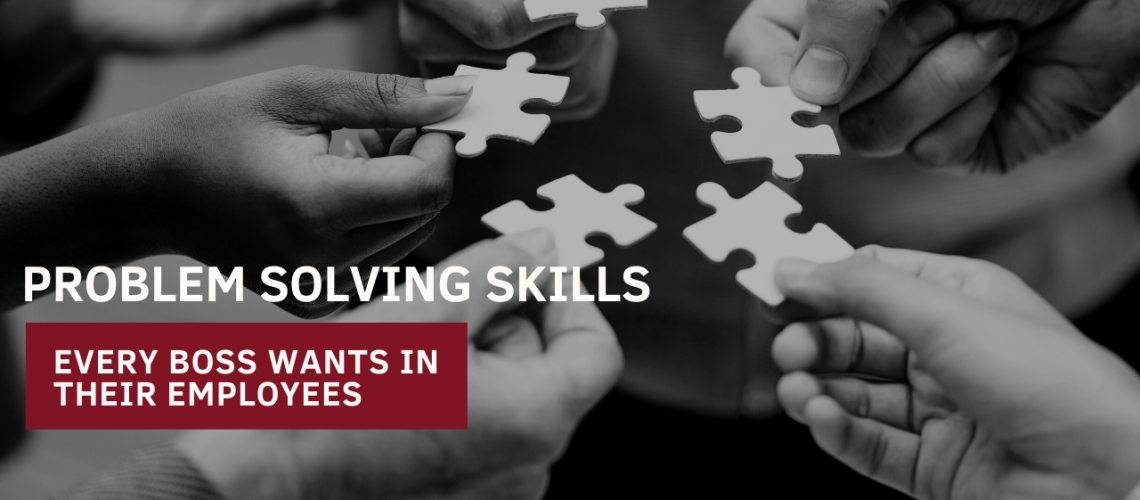
As businesses grow and evolve, so do the skills employers look for in their teams. Gone are the days of hiring people just because they have a degree or certificate—now, employers want to make sure their candidates demonstrate problem-solving skills that can help them achieve their business goals.
If you were to name the most valuable skills an employer could want in their employees, problem solving skills would probably top the list. At the heart of any problem-solving situation is a person or people who are faced with a challenge and need to resolve it. That’s no easy task for anyone, but innovation and initiative are some of the characteristics that can make both problem-solving situations more productive and positive outcomes more probable.
Problem Solving Skills employee Need
In today’s ever-changing workplace, problem solving skills are essential for success. Bosses want employees who can identify problems and come up with creative solutions. it is critical to have problem-solving skills. Whether you are a manager or an employee, having problem-solving skills can help you to effectively address issues and challenges that arise in the workplace. From time management to communication and collaboration, having strong problem-solving skills can make a huge difference in how quickly and efficiently tasks are completed. In this blog post, we will go over some of the key elements of problem solving that all employees should be aware of and aim to master.
1- Analytical Skills
Analytical skills are critical for problem solving. Employees need to be able to understand and analyze data, identify patterns and trends, and make decisions based on their findings.
When faced with a problem, the first step is to gather information and data. This can include talking to people who are affected by the problem, researching the issue online or in other sources, and looking at any relevant data that may already exist. Once you have a good understanding of the problem, you can start to look for potential solutions.
To find the best solution, you will need to consider all of the available options and weigh their pros and cons. Once you have a few possible solutions, it’s time to test them out and see which one works best. The final step is to implement the chosen solution and continue monitoring it to make sure it is effective.
If you want to be successful in solving problems at work, it is essential that you develop strong analytical skills. By taking the time to understand the problem and identify potential solutions, you can make sure that you find the best possible solution for your workplace.
2- Creativity
Creativity is one of the most important problem solving skills an employee can have. Being creative means being open to new ideas and finding new ways to solve problems. It also means being able to think outside the box and come up with innovative solutions.
creativity allows employees to see problems from different perspectives and find solutions that are not obvious. It helps them to be more flexible in their thinking and be more open to new ideas. Being creative also allows employees to better adapt to change and find new ways to do things.
Employees who are creative are always in high demand because they bring new ideas and perspective
3- Judgment
Judgment is the ability to make decisions based on limited information. It’s an important skill for employees because it allows them to take action when there isn’t time to gather all the facts.
Good judgment comes from experience and knowledge. The more you know about a subject, the easier it is to make a good decision. That’s why it’s important for employees to keep learning and expanding their skills.
There are times when even the best-informed person can’t make a good decision. That’s when it’s important to trust your instincts and go with your gut feeling.
4- Communication
In order to be a successful problem solver, you need to have excellent communication skills. You need to be able to clearly and concisely explain the problem, as well as your proposed solution. You also need to be a good listener, so that you can understand the other person’s point of view. If you can’t communicate effectively, you’ll never be able to find a mutually acceptable solution.
5- Teamwork
Most employers today are looking for employees who have strong problem solving skills. However, these skills are not always easy to come by. Many people think that they need to be able to work independently in order to be a good problem solver, but this is not always the case. In fact, many of the best problem solvers are those who know how to work well with others.
Teamwork is one of the most important problem solving skills that an employee can have. When problems arise, it is often necessary for employees to work together in order to find a solution. This requires good communication, as well as the ability to compromise and collaborate. Those who are able to effectively work with others will often find that they are able to solve problems more quickly and efficiently than those who try to do everything on their own.
Those who are able to effectively work with others and communicate well will often find that they are able to solve problems more quickly and efficiently than those who try to do everything on their own.
6- Evaluation
Problem solving is not just a talent but also a skill that is critical in becoming successful in business. One of the central aspects of problem solving is evaluating possible solutions to find the least costly and most cost-effective way to overcome problems. Evaluation plays an important role in every decision process as it helps compare and contrast different choices, especially when dealing with negative impact on productivity and efficiency. Evaluating different solutions will ensure you choose the best solution for your organization.
Steps Of Solving A Problem:
Whether you are trying to solve a problem in your own personal life, or at work, there are certain steps we can take to ensure a successful outcome. these steps will give you a framework for tackling any challenge with confidence and ease.
Identify And Define The Problem
When you encounter a problem, the first thing you need to do is identify and define it. This may seem like a simple task, but it’s actually vitally important. If you don’t take the time to properly identify and define the problem, you run the risk of solving the wrong problem or making the problem worse.
To properly identify and define a problem, you need to ask yourself some questions:
- What are the symptoms of the problem?
- When did the problem start?
- Has the problem been getting better or worse?
- What seems to be causing the problem?
- Who is affected by the problem?
- What are the consequences of the problem?
Answering these questions will help you get a clear picture of what the problem is and what needs to be done to solve it.
Come Up With Possible Solutions.
There is no one-size-fits-all answer when it comes to coming up with possible solutions to a problem. However, there are some general steps that can be followed in order to generate potential solutions.
- Define The Problem. This may seem like an obvious step, but it is important to take the time to really identify and understand the problem at hand. Once the problem has been clearly defined, it will be much easier to come up with possible solutions.
- Brainstorm Potential Solutions. This is the time to let your creative juices flow and come up with as many potential solutions as possible. At this stage, it is important not to judge or evaluate any of the ideas – just let them flow freely.
- Evaluate The Potential Solutions. Once you have a list of potential solutions, it’s time to start evaluating them. Consider things like feasibility, cost, and effectiveness when making your decisions.
- Choose The Best Solution (or combination of solutions). After careful evaluation, you should be able to choose the best solution (or combination of solutions) for your particular situation.
- Implement The Solution (or combination of solutions). Now it’s time to put your plan into action and implement the chosen solution (or combination of solutions).
When you have a problem, it is important to evaluate all of the potential options for solving that problem. This will help you to determine which option is best for your particular situation. To evaluate the options, you will need to consider a few factors:
Evaluate The Options.
When you have a problem, it is important to evaluate all of the potential options for solving that problem. This will help you to determine which option is best for your particular situation. To evaluate the options, you will need to consider a few factors:
- The Severity Of The Problem: How big of a problem is this? Is it a life-threatening issue or something that can be easily fixed?
- The Cost Of Each Option: What will it cost to implement each solution? Is one option more expensive than another?
- The Time Required To Fix The Problem: How long will it take to fix the problem using each option? Is one solution faster than another?
- The Likelihood Of Success: What are the chances that each option will actually solve the problem? Are some options more likely to succeed than others?
Choose The Best Solution.
There are many different ways to solve a problem, but not all of them are equally effective. When choosing a solution, it is important to consider the following factors:
- The Nature Of The Problem: Some problems are more complex than others, and some may require multiple solutions.
- The Resources Available: Some solutions may require more time or money than you have available.
- Your Goals: What do you hope to achieve by solving the problem? Choose a solution that will help you meet your goals.
- Your Preferences: Some people prefer to work alone while others prefer to collaborate. Some people like to take risks while others prefer to play it safe. Consider your own preferences when choosing a solution.
Implement The Solution.
When you have a plan for solving your problem, it’s time to implement the solution. This can be tricky, especially if the solution requires changing your behavior. But if you’re committed to solving the problem, you’ll find a way to make it work.
Here are some tips for implementing your solution:
- Break It Down Into Manageable Steps. If the solution seems overwhelming, break it down into smaller steps that you can handle.
- Take Action Immediately. Don’t wait to start implementing your solution – the sooner you start, the sooner you’ll see results.
- Get Support From Others. If possible, get support from friends or family members who can help you stick to your plan.
- Be Prepared For Setbacks. There will likely be times when you slip up or don’t follow through on your plan perfectly. That’s okay – just get back on track as soon as possible and don’t give up altogether.
- Celebrate Your Success! When you achieve your goal, take a moment to celebrate – this will help motivate you to keep going when things get tough
Evaluate The Outcome.
After you have implemented a solution, it is important to take a step back and evaluate the results. Did the solution work as intended? Are there any unforeseen consequences? This is an important step in the problem-solving process, as it allows you to learn from your mistakes and continue to improve your methods.
Problem-solving skills are essential for any business to succeed and bosses want these skills in their employees. By taking the time to learn and practice problem solving, you can improve your own problem-solving abilities, which will help you become a more valuable asset to any company. Remember that good problem-solving requires creative thinking, research, collaboration with others, and actionable steps—all of which require effort but have the potential to yield great results! With dedication and hard work, anyone can develop their problem-solving skills.


